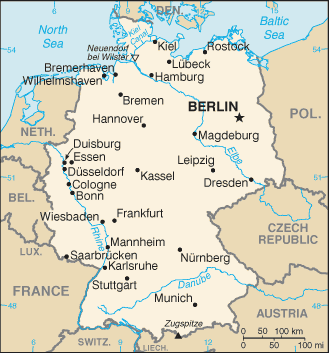| The
Federal Republic of
Germany (German: Bundesrepublik Deutschland) is a federation of 16
states
and one of the world's leading industrialized countries, located in the
middle of the European Union. Germany is bordered to the north by the
North
Sea, Denmark and the Baltic Sea, to its east by Poland and the Czech
Republic,
to the south by Austria and Switzerland and to its west by France,
Luxembourg,
Belgium and the Netherlands.
The current
population of
Germany is over 80 million, primarily German residents and about 7
million
foreign residents, the largest single nationality group of whom are
Turkish.
Germany has been a prime destination for refugees from many developing
countries, in part because its constitution long had a clause giving a
'right' to political asylum, but restrictions over the years have made
it less attractive.
Germany has
one of the world's
highest levels of education, technological development, and economic
productivity.
Germany is a broadly middle class society with a per capita income
level
of about $25,000. A generous social welfare system provides for
universal
health care, unemployment compensation, and other social needs. Germans
also are very mobile; millions travel abroad each year.
With
unification on October
3, 1990, Germany began the major task of bringing the standard of
living
of Germans in the former German Democratic Republic (GDR) up to that of
western Germany. This will be a lengthy and difficult process due to
the
relative inefficiency of industrial enterprises in the former GDR,
difficulties
in resolving property ownership in eastern Germany, and the inadequate
infrastructure and environmental damage that resulted from decades of
communist
rule. Since reunification, hundreds of thousands of former East Germans
have migrated into western Germany to find work.
The weather
in Germany is
sometimes unpredictable. In the middle of summer it could be warm and
sunny
one day and then cold and rainy the next. However truly extreme weather
conditions, like severe droughts, tornados, destructive hailstorms,
severe
frost or heat etc. are all extremely rare. There have been two bad
large-scale
floodings in the last few years, but in the long term those are also
quite
rare. Damaging earthquakes are unheard-of.
Germany's
contributions to
the world's cultural heritage are numerous, and the country is often
known
as das Land der Dichter und Denker (The Land of Poets and Thinkers).
Germany
was the birthplace of composers such as Beethoven, Bach, Brahms,
Schumann
and Wagner; poets such as Goethe and Schiller as well as Heine;
philosophers
including Kant, Hegel, Marx and Nietzsche, theologians like Luther and
Bonhoeffer, authors including Hermann Hesse and Grass; scientists
including
Einstein, Born, Planck, Heisenberg, Hertz and Bunsen; and engineers
such
as Otto, Daimler, Benz, Diesel and Linde. There are also numerous fine
artists from Germany such as the Renaissance artist Max Ernst, the
expressionist
Franz Marc, the conceptual artist Joseph Beuys or the neo expressionist
Georg Baselitz.
 Cologne
Germany - Cologne
(German: Köln) is Germany's fourth-largest city (after Berlin,
Hamburg and Munich), and is the largest city both in the German Federal
State of North Rhine-Westphalia and within the Rhine-Ruhr Metropolitan
Area,
one of the major European metropolitan areas with more than ten million
inhabitants. Cologne
Germany - Cologne
(German: Köln) is Germany's fourth-largest city (after Berlin,
Hamburg and Munich), and is the largest city both in the German Federal
State of North Rhine-Westphalia and within the Rhine-Ruhr Metropolitan
Area,
one of the major European metropolitan areas with more than ten million
inhabitants.
 Travel
Germany - Tourism in Germany has improved since the end of
World
War II and many tourists visit Germany to experience a sense of
European
history. The countryside exhibits a pastoral aura, while its cities
exhibit
both a modern and classical feel. Travel
Germany - Tourism in Germany has improved since the end of
World
War II and many tourists visit Germany to experience a sense of
European
history. The countryside exhibits a pastoral aura, while its cities
exhibit
both a modern and classical feel.
|
|
 Daytrips
Germany - Now in its sixth edition, Daytrips Germany has
long been a favorite
guidebook for adventurous travelers who prefer to make their own tours.
Each of the 60 one-day adventures is complete with a do-it-yourself
walking tour, a map, full travel directions, time and weather
considerations, restaurant suggestions, background information, and
concise descriptions of all worthwhile sights. Daytrips
Germany - Now in its sixth edition, Daytrips Germany has
long been a favorite
guidebook for adventurous travelers who prefer to make their own tours.
Each of the 60 one-day adventures is complete with a do-it-yourself
walking tour, a map, full travel directions, time and weather
considerations, restaurant suggestions, background information, and
concise descriptions of all worthwhile sights.
 German
Survival Guide This
information-packed mini-course concentrates on preparing readers
to travel in Germany and Austria in a limited time by focusing on what
is most useful or interesting to travelers and cutting out unnecessary
vocabulary and grammar. German
Survival Guide This
information-packed mini-course concentrates on preparing readers
to travel in Germany and Austria in a limited time by focusing on what
is most useful or interesting to travelers and cutting out unnecessary
vocabulary and grammar.
|
 |













